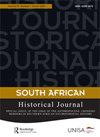种族隔离最后十年南非福音派的分裂
IF 1
3区 历史学
Q1 HISTORY
引用次数: 1
摘要
摘要传统上,福音派基督徒即使只是被动地支持当时的政府,也不愿在政治问题上表明立场。在种族隔离制度下,这代表了黑人福音派的困境。他们中的大多数人每天都经历着政权的邪恶影响。但他们无法从宗教角度表达对种族隔离的反对。情况在20世纪80年代中期发生了变化。两项雄心勃勃的倡议在这一时期曝光,表明福音派并不一定不关心政治。第一个是全国和解倡议(NIR),这是一项由总部位于彼得马里茨堡的福音派使命组织非洲企业发起的支持跨种族和解的运动。我认为,至少在短期内,NIR没有达到其目标,黑人活动家认为这无关紧要,荷兰归正教会(DRC)的大多数部长也忽视了这一点。与此同时,一群主要来自索韦托的黑人福音派人士组成了一个名为“关注福音派”的运动,挑战了基于信仰的和解足以解决危机的观念。第一次,一个福音派团体对南非的种族隔离采取了激进的立场。它的创立在一段时间内认可了南非福音派的制度分裂。本文章由计算机程序翻译,如有差异,请以英文原文为准。
The Splintering of South African Evangelicalism during the Last Decade of Apartheid
ABSTRACT Traditionally, evangelical Christians support, if only passively, the government of the day and are reluctant to take a stand on political issues. Under apartheid, this represented a dilemma for black evangelicals. Most of them experienced the evil effects of the regime on a daily basis. But they were unable to articulate their opposition to apartheid in religious terms. The situation changed in the mid-1980s. Two ambitious initiatives saw the light during this period, signalling that evangelicals are not necessarily apolitical. The first was the National Initiative for Reconciliation (NIR), a campaign in favour of reconciliation across racial lines launched by African Enterprise, an evangelical mission organisation based in Pietermaritzburg. I argue that – dismissed as irrelevant by black activists and ignored by the majority of Dutch Reformed Church (DRC) ministers – the NIR did not reach its objectives, at least in the short term. Meanwhile, a group of black evangelicals, largely from Soweto, formed a movement called Concerned Evangelicals, which challenged the notion that faith-based reconciliation was sufficient to resolve the crisis. For the first time, an evangelical body was taking a radical stance on apartheid in South Africa. Its creation sanctioned – for a while – the institutional division of South African evangelicalism.
求助全文
通过发布文献求助,成功后即可免费获取论文全文。
去求助
来源期刊

South African Historical Journal
Multiple-
CiteScore
0.70
自引率
0.00%
发文量
37
期刊介绍:
Over the past 40 years, the South African Historical Journal has become renowned and internationally regarded as a premier history journal published in South Africa, promoting significant historical scholarship on the country as well as the southern African region. The journal, which is linked to the Southern African Historical Society, has provided a high-quality medium for original thinking about South African history and has thus shaped - and continues to contribute towards defining - the historiography of the region.
 求助内容:
求助内容: 应助结果提醒方式:
应助结果提醒方式:


